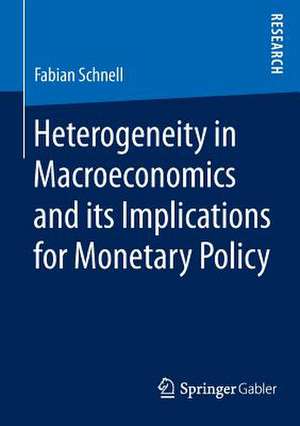Heterogeneity in Macroeconomics and its Implications for Monetary Policy
Autor Fabian Schnellen Limba Engleză Paperback – 7 mai 2015
Preț: 381.00 lei
Nou
Puncte Express: 572
Preț estimativ în valută:
72.91€ • 76.66$ • 60.24£
72.91€ • 76.66$ • 60.24£
Carte tipărită la comandă
Livrare economică 17 aprilie-01 mai
Preluare comenzi: 021 569.72.76
Specificații
ISBN-13: 9783658097301
ISBN-10: 3658097302
Pagini: 184
Ilustrații: XVIII, 166 p. 11 illus.
Dimensiuni: 148 x 210 x 12 mm
Greutate: 0.25 kg
Ediția:2015
Editura: Springer Fachmedien Wiesbaden
Colecția Springer Gabler
Locul publicării:Wiesbaden, Germany
ISBN-10: 3658097302
Pagini: 184
Ilustrații: XVIII, 166 p. 11 illus.
Dimensiuni: 148 x 210 x 12 mm
Greutate: 0.25 kg
Ediția:2015
Editura: Springer Fachmedien Wiesbaden
Colecția Springer Gabler
Locul publicării:Wiesbaden, Germany
Public țintă
ResearchCuprins
Introduction: Heterogeneity and Macroeconomics.- Can Monetary Policy Delay the Reallocation of Capital?.- Business Cycles and Monetary Policy with Productivity Heterogeneity.- What Determines Price Changes and the Distribution of Prices? Evidence from the Swiss CPI.
Notă biografică
Fabian Schnell, Ph.D., works as a research associate at the University of St. Gallen and as a project leader for economic policy at economiesuisse, the Swiss Business Federation.
Textul de pe ultima copertă
Fabian Schnell develops a model indicating that by keeping real interest rates too low, monetary policy can distort the allocation of resources across firms and potentially delay economic recovery after a recession. This is a new channel of monetary policy that is especially relevant in view of “Quantitative Easing” programs. A second model focuses on the short-term implications of heterogeneously productive firms, showing an acceleration effect of technology shocks. Finally, an empirical investigation of firms’ price-setting behaviors shows that time-dependent factors, relative to state-dependent ones, play a small role with respect to the probability and the size of a price change. All results provide new insights for monetary policy.
Contents
Fabian Schnell, Ph.D., works as a research associate at theUniversity of St. Gallen and as a project leader for economic policy at economiesuisse, the Swiss Business Federation.
Contents
- Introduction: Heterogeneity and Macroeconomics
- Can Monetary Policy Delay the Reallocation of Capital?
- Business Cycles and Monetary Policy with Productivity Heterogeneity
- What Determines Price Changes and the Distribution of Prices? Evidence from the Swiss CPI
Target Groups - Researchers and students in macroeconomics
- Governmental institutions and central banks
- Managers of commercial banks, nongovernmental organizations, think tanks
Fabian Schnell, Ph.D., works as a research associate at theUniversity of St. Gallen and as a project leader for economic policy at economiesuisse, the Swiss Business Federation.
Caracteristici
Study in the field of economics Includes supplementary material: sn.pub/extras











